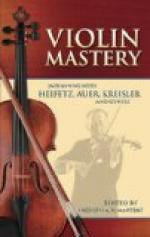[Illustration: ADOLFO BETTI, with hand-written note]
“For instance Stravinsky, in the first of his three impressionistic sketches for quartet (which we have played), has the first violin play ponticello throughout, not the natural ponticello, but a quite special one, to produce an effect of a bag-pipe sounding at a distance. I had to try again and again till I found the right technical means to produce the effect desired. Then, the ’cello is used to imitate the drum; there are special technical problems for the second violin—a single sustained D, with an accompanying pizzicato on the open strings—while the viola is required to suggest the tramp of marching feet. And, again, in other modern quartets we find special technical devices undreamt of in earlier days. Borodine, for instance, is the first to systematically employ successions of harmonics. In the trio of his first quartet the melody is successively introduced by the ’cello and the first violin, altogether in harmonics.
THE MODERN QUARTET AND AMATEUR PLAYERS
“You ask me whether the average quartet of amateurs, of lovers of string music, can get much out of the more modern quartets. I would say yes, but with some serious reservations. There has been much beautiful music written, but most of it is complicated. In the case of the older quartets, Haydn, Mozart, etc., even if they are not played well, the performers can still obtain an idea of the music, of its thought content. But in the modern quartets, unless each individual player has mastered every technical difficulty, the musical idea does not pierce through, there is no effect.
“I remember when we rehearsed the first Schoenberg quartet. It was in 1913, at a Chicago hotel, and we had no score, but only the separate parts. The results, at our first attempt, were so dreadful that we stopped after a few pages. It was not till I had secured a score, studied it and again tried it that we began to see a light. Finally there was not one measure which we did not understand. But Schoenberg, Reger, Ravel quartets make too great a demand on the technical ability of the average quartet amateur.




